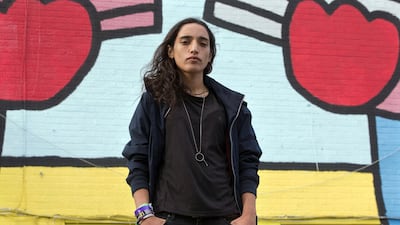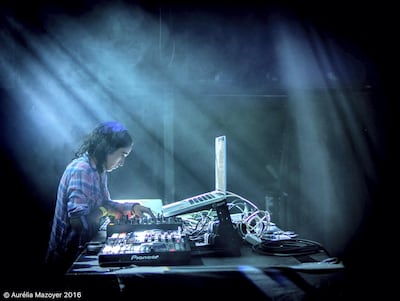For many touring DJs jetting across the world to play club nights and festivals every week while also recording in the studio, finding time for rest and relaxation can be a challenge.
But Palestinian techno DJ and producer Sama Abdulhadi, known by her stage name Sama, believes she has the answer. "I literally used to ask every DJ: 'How are you still alive?'" she says. "When I would meet a big DJ who was touring all the time, I was like: 'When do you guys sleep?'.
"But then I found out that humans are actually superheroes. They don't really need eight hours of sleep a night. It's a lie. Nothing will happen if you don't sleep eight hours. You can sleep two hours a day and you'll be fine."
It's an interesting piece of advice. And perhaps it's one she feels compelled to live by right now, given how hectic her schedule is.
Introducing a new sound to Palestine
The DJ, 28, spoke to The National in London before a headlining gig at Islington music venue Electrowerkz, organised by MARSM, an events company that specialises in promoting Arab culture in the UK.
The event also featured some of Sama's favourite DJs from around the region: Beirut's Jason Kaakoush and Rise 1969, as well as Tehran-raised star Anahita Shamsaei. Her London gig was followed only hours later with a festival in Norway, where she performed alongside the likes of Ben Klock, a favourite of the world's most selective club, Berghain, and US house legend Kerri Chandler.

But this jet-set lifestyle is a far cry from a few years ago, when Sama – who is widely credited as the woman who brought techno to Palestine – first started mixing at parties in the West Bank. Up until the age of 16, she had enjoyed some trance – in particular Dutch DJ Tiesto – but mainly rap and hip hop, which took over the underground music scene in Ramallah around 2004.
"I used to dance to hip hop and try to sing to rap – until I heard my voice singing rap and then I stopped singing rap," she laughs. But it wasn't until she arrived in Beirut for a two-year course on analogue synthesisers that her life's trajectory changed forever.
"When I went to Lebanon, I discovered techno by mistake. I was studying there but not studying much," she says. Beirut's club scene almost revolved around techno at the time. So what was it that she liked about the genre so much? "I guess it was the lack of words, the darker sounds," she says.
“I liked them more than the trancey, high-frequency sounds. I was going to everything from commercial pop, trance, hip hop... It was all new to me, I went to literally anything and everything that made me dance. In time, I started leaving genres and sticking to techno. Now I listen to a lot of things but in the EDM scene, it’s just house and techno. I don’t listen to trance any more.”
Palestine wasn't ready for techno, but it is now
When Sama returned from Beirut with her newfound love of techno and began holding techno parties, she found that Ramallah and Palestine weren't quite ready. "In the beginning, everybody went home, nobody liked it and everybody asked for their money back," she says. "I lost so much money that my mum used to hate what I did. She used to ask me 'why are you giving yourself so much heartache?'"
But the tide began to slowly turn when she met party promoter Fidaa Kiwan from Haifa, who had just started running a bar called Lawain in Ramallah and was allowing people to play new forms of music there. Kiwan connected Sama with Jazar Crew, a Palestinian art and culture collective in Haifa, and they began to organise gigs together.
“We took over and we started doing parties and it went crazy. It’s still going crazy up until now,” Sama says. “Now, there are about 40 DJs or something.”
While Israel, and in particular Tel Aviv, has a strong nightlife scene, restrictions on travel and constant oppression from the Israeli authorities has resulted in the party scene in the West Bank remaining largely underground. It's meant that Kaakoush, who is a good friend of Sama, can't DJ in Ramallah because of his Lebanese passport.
“Usually, the curfew for every party is when the police come and stop it. They come to every party,” she says.
She originally wanted to live in London, but couldn't get a visa
Sama, who was originally known as Skywalker, moved to Europe to develop her musical career. After studying audio engineering and music production in London and working in Egypt for a NGO, Sama now lives in Paris, where she had a residency at Cite Internationale des Arts.
She would have loved to have stayed in London after completing her studies. "You don't get a visa easy. I graduated from London and for seven years they wouldn't give me a visa. Even [in the beginning] when I lived in France, they wouldn't give me a visa," she says. "I'm in France now because they've given me a visa. I love French people."

She loves Berlin as well, known as the world hub for techno and home to Berghain. Anyone who has queued for hours only to be turned away by the club's infamous doorman can take comfort in the fact that even Sama has struggled to gain entry.
"They told me no a bunch of times," she says. "One time, I was there after playing a gig nearby so carried my equipment with me afterwards and the doorman said no. I said: 'Dude, I have an actual meeting up there.' And he said: 'I don't care.' But then another guy from inside told him I was an actual DJ and they let me in."
'When you grow up in Palestine... you grow up hating everybody in the world'
Sama still goes back to the West Bank to visit her family and play there, most notably last year, when she played a Boiler Room set. A live video of the show has almost three million views on YouTube and was the first time the online music platform broadcast from Palestine. Around the same time as Sama's Boiler Room debut, a movement called DJs for Palestine emerged, urging international DJs to take part in the cultural boycott of Israel. The support shown to Palestinian artists by high profile DJs such as The Black Madonna, Ben UFO and Four Tet has been a source of hope for Sama and those in the Palestinian rave scene.
"I loved it. I just thanked The Black Madonna for it a couple of weeks ago," she says.
"For us it gives us a push that somebody else is noticing what is happening and supporting us. When you grow up in Palestine you think you're alone because you wonder why isn't anybody coming and doing anything? This was my childhood idea so you grow up hating everybody in the world. But then I left home, I went to Lebanon and I saw it was more messed up there. Then you feel sad and realise why nobody is doing anything is because nobody can do anything."
So what's next for the pioneering DJ? "Well, next year I'm turning 30 and I hope I turn into a human being and not a creature. I'm still discovering and I'm still a child. I'm hoping to grow up next year. I have to grow up, for my dad's sake," she smiles.



